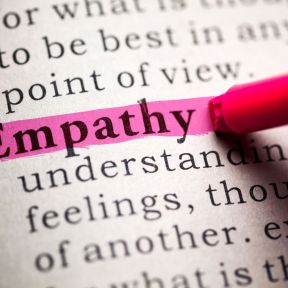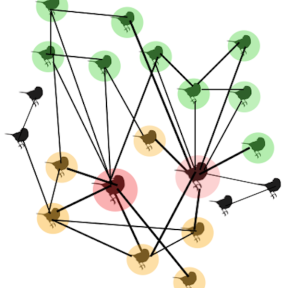
Altruism
Altruism is acting to help someone else at some cost to oneself. It can include a vast range of behaviors, from sacrificing one’s life to save others, to giving money to charity or volunteering at a soup kitchen, to simply waiting a few seconds to hold the door open for a stranger. Often, people behave altruistically when they see others in challenging circumstances and feel empathy and a desire to help.

Altruistic urges and behaviors are an important part of the glue that binds families and social groups together, helping them to cooperate and thrive. Individuals who go out of their way to aid others often receive something in return—whether it’s an intangible reward, such as admiration and respect, or material support at a later time. Altruistic impulses and the reciprocation of kind deeds help ensure all members of a tight-knit group have backup when they need it.
It seems to be for most people. Cooperative behavior allowed our ancestors to survive under harsh conditions, and it still serves a purpose in a highly complex society.
Altruism can be viewed as both. In some sense, altruists put others’ interests ahead of their own—but giving to others often feels good and can result in longer-term gains for the giver. "Reciprocal altruism" is a term used by scientists for helping that is sustained by an eventual payoff from the person that receives help.
Even when people don’t expect recognition or reward for a good deed, they often feel energized and happy afterward—a sensation sometimes called a "helper's high” or “warm glow.” It likely helps to reinforce altruistic behavior in those who feel it.
Many species benefit when individuals put service to the larger group ahead of their own personal interest. A variety of animals, from rats to bonobos to whales, have been caught engaging in apparently altruistic behavior.
Altruism isn’t always a strictly warm-and-fuzzy experience. Altruistic punishment is a term for a costly act that punishes someone in order to benefit others, such as intervening when someone is being bullied.

Most people are inclined to help out a best friend or a close family member in need. But how far does that kindness extend? Some people are clearly more or less altruistic than others—with callous psychopaths, perhaps, on the low end, people who risk their lives for strangers on the other end, and the rest of us in the middle. Many forces, both internal and external, likely underlie these individual differences in altruism.
Even young children feel good about sharing, and to some extent, altruistic tendencies may be built-in for most people. Many altruistic acts are reactive: Human beings respond compassionately when they see others in pain and in need of help. Of course, people also learn norms of altruism within their culture, including how much or how little generosity is considered acceptable.
Neurological, cultural, and other kinds of factors may cause some people to be more altruistic than others. So-called “extreme altruists” appear to differ from others in the size of their brains’ amygdala and their responsiveness to signs of distress. External influences such as a religious upbringing or socioeconomic status may also play a role.
Close relatives (such as parents and siblings) share many more of a person’s genes than others do. According to evolutionary theory, an interest in helping close kin spread those shared genes by surviving and reproducing—a sort of favoritism called kin selection—helps explain why humans are more likely to help those relatives than strangers or even distant family members.














